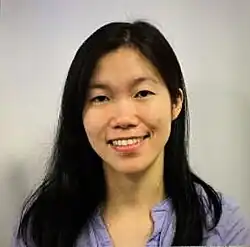Si Ying Lee
Si Ying Lee | |
|---|---|
 | |
| Alma mater | Harvard University (PhD) National University of Singapore (BS) |
| Known for | Contributions to Shimura varieties Work on the Langlands program |
| Awards | Maryam Mirzakhani New Frontiers Prize (2025) |
| Scientific career | |
| Fields | Mathematics |
| Institutions | National University of Singapore Stanford University (2023–2025) Max Planck Institute for Mathematics (2022–2023) |
| Doctoral advisor | Mark Kisin |
Si Ying Lee is a Singaporean mathematician who specializes in number theory, particularly arithmetic geometry and the Langlands program. She is currently an Assistant Professor of Mathematics at the National University of Singapore.[1] In 2025, she won the Maryam Mirzakhani New Frontiers Prize for her contributions to the theory of Shimura varieties.[2]
Early life and education
Lee completed her undergraduate studies at the National University of Singapore in 2017.[3] She earned her PhD in Mathematics from Harvard University in 2022 under the supervision of Mark Kisin.[4] Her doctoral thesis focused on Eichler-Shimura congruence relations for Shimura varieties of Hodge type.[1]
Career
After completing her PhD, Lee held a position at the Max Planck Institute for Mathematics in Bonn from 2022 to 2023.[1] She then served as a Szegö Assistant Professor at Stanford University from 2023 to 2025.[5] At Stanford, she taught courses including Topics in Number Theory (MATH 249C), Calculus (MATH 21), and Linear Algebra and Matrix Theory (MATH 113).[6]
Lee returned to the National University of Singapore as an Assistant Professor, where she continues her research in number theory.[1]
Research
Lee's research focuses on arithmetic geometry and the Langlands program, with particular emphasis on the theory of Shimura varieties.[1] Her doctoral thesis established Eichler-Shimura congruence relations for Shimura varieties of Hodge type, extending classical results to a broader class of varieties.[7]
In her prize-winning work, Lee developed "a new approach to a problem in the Langlands program" and made significant contributions to understanding Shimura varieties, which serve as "a special type of classifying spaces that can connect number theory and geometry".[8]
Awards and honors
In 2025, Lee received the Maryam Mirzakhani New Frontiers Prize, which includes a $50,000 award.[2][9] The prize citation recognized her "for contributions to the theory of Shimura varieties".[2] Upon receiving the award, Lee stated: "Winning this prize was both a validation of my research and a real honor since it is named in the honor of Maryam Mirzakhani".[8] She acknowledged her collaborators, her mentor Richard Taylor at Stanford, and her doctoral adviser Mark Kisin at Harvard.[8]
Selected publications
- Lee, Si Ying (2020). "Eichler-Shimura Relations for Shimura Varieties of Hodge Type". arXiv:2006.11745. Retrieved 9 August 2025.
{{cite journal}}: Cite journal requires|journal=(help) - Lee, Si Ying (2022). "Semisimplicity of étale cohomology of certain Shimura varieties". arXiv:2206.07283. Retrieved 9 August 2025.
{{cite journal}}: Cite journal requires|journal=(help)
References
- ^ a b c d e "Si Ying Lee". Personal Website. Retrieved 9 August 2025.
- ^ a b c "Si Ying Lee Receives 2025 Maryam Mirzakhani New Frontiers Prize". harvard.edu. 11 April 2025. Retrieved 9 August 2025.
- ^ "NUS Faculty of Science Facebook Post". Facebook. NUS Faculty of Science. Retrieved 9 August 2025.
- ^ "Si Ying Lee - The Mathematics Genealogy Project". Mathematics Genealogy Project. Retrieved 9 August 2025.
- ^ "Si Ying Lee and Jeongwan Haah awarded 2025 Breakthrough Prize awards". Stanford Mathematics. September 2024. Retrieved 9 August 2025.
- ^ "Si Ying Lee - Stanford Course Listings". Stanford University. Retrieved 9 August 2025.
- ^ Lee, Si Ying (2020). "Eichler-Shimura Relations for Shimura Varieties of Hodge Type". arXiv:2006.11745. Retrieved 9 August 2025.
{{cite journal}}: Cite journal requires|journal=(help) - ^ a b c "Si Ying Lee and Jeongwan Haah awarded 2025 Breakthrough Prize awards". Stanford Report. 12 September 2024. Retrieved 9 August 2025.
- ^ "Stanford researchers honored with 2025 Breakthrough prizes". Stanford School of Humanities and Sciences. Retrieved 9 August 2025.